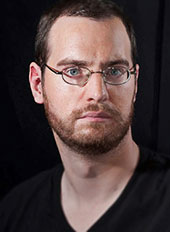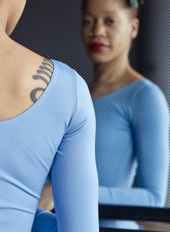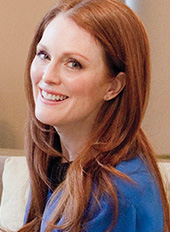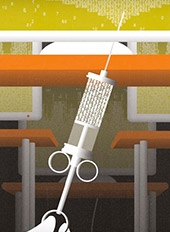They live mere blocks apart in Manhattan, and each is the mother of two children. They both attended BU’s College of Fine Arts, and they share interests in storytelling, interior design, and healthy cooking.
When Julianne Moore (CFA’83), an Academy Award–nominated actor, and Gael Towey (CFA’75), the longtime chief creative director at Martha Stewart Living Omnimedia (MSLO), first met at a CFA alumni dinner, it was clear they had much in common—not least, their status as highly accomplished and multitalented women.
Moore, known for her intelligence, versatility, and distinctive red hair, has appeared in more than 50 films, ranging from the 1998 cult favorite The Big Lebowski to 2010’s critically acclaimed The Kids Are All Right. She has earned a Daytime Emmy, six Golden Globe nominations, and four Oscar nominations.
In addition, Moore’s interior design talents have been featured in The World of Interiors magazine, and her popular Freckleface Strawberry children’s book series has inspired a successful off-Broadway musical.
After working as design director for House & Garden magazine, Towey joined Martha Stewart Living in 1990 as its founding art director. She designed the magazine’s inaugural issue, establishing its iconic and award-winning visual style, and then moved into progressively larger roles at MSLO, directing the design of products from magazines and books to home furnishings and merchandise. This year she became chief integration and creative director, overseeing the creation of digital magazines and mobile applications for the multimillion-dollar Martha Stewart brand.
The College of Fine Arts recently brought Moore and Towey together again. Moore took a break from a busy schedule promoting the HBO movie Game Change, in which she portrays former Alaska governor and GOP vice presidential candidate Sarah Palin, to talk with Towey about arts education, raising children to be creative, and living a life in the arts.
![]()

 Towey drove the 2010 launch of “Boundless Beauty,” a special iPad edition of Martha Stewart Living, which won the Society of Publication Designers inaugural Tablet App of the Year Award. MSLO has since introduced a series of mobile apps and iPad versions of Living and Everyday Food.
Towey drove the 2010 launch of “Boundless Beauty,” a special iPad edition of Martha Stewart Living, which won the Society of Publication Designers inaugural Tablet App of the Year Award. MSLO has since introduced a series of mobile apps and iPad versions of Living and Everyday Food. In 2010, Towey took part in the rebranding of health and lifestyle magazine Body+Soul as Whole Living.
In 2010, Towey took part in the rebranding of health and lifestyle magazine Body+Soul as Whole Living. As MSLO’s chief creative director, Towey helped to spearhead the launch of several magazine titles, including the sumptuous Martha Stewart Weddings.
As MSLO’s chief creative director, Towey helped to spearhead the launch of several magazine titles, including the sumptuous Martha Stewart Weddings.
 During her senior year at CFA, Julianne Moore (known then as Julie Anne Smith) performed in a student production of the French farce A Flea in Her Ear. Photo by Mark Morelli
During her senior year at CFA, Julianne Moore (known then as Julie Anne Smith) performed in a student production of the French farce A Flea in Her Ear. Photo by Mark Morelli Moore starred with Colin Firth in the 2009 film A Single Man, which was set in 1960s Southern California and featured meticulously designed costumes.
Moore starred with Colin Firth in the 2009 film A Single Man, which was set in 1960s Southern California and featured meticulously designed costumes. Her pitch-perfect portrayal of Jules, the easygoing half of the lesbian couple in The Kids Are All Right, earned Moore a 2011 Golden Globe nomination.
Her pitch-perfect portrayal of Jules, the easygoing half of the lesbian couple in The Kids Are All Right, earned Moore a 2011 Golden Globe nomination. Moore could be seen in theaters this spring in Being Flynn, the movie adaptation of Nick Flynn’s memoir Another Bullshit Night in Suck City.
Moore could be seen in theaters this spring in Being Flynn, the movie adaptation of Nick Flynn’s memoir Another Bullshit Night in Suck City.





 Twitter
Twitter Facebook
Facebook
Comments
On 26 July 2012 at 9:02 PM, Christopher Huggins (COM’69) wrote:
Gotta tell ya'! I love this webpage with the scrolling chat bubbles on the "More on Moore"! So very cool. Whoever designed it deserves credit for something very special. Well done!
On 26 July 2012 at 2:12 PM, Joan O'Connor (COM) wrote:
Simply outstanding article. Two great, very accomplished women. Inspiring! Ironically I received the print version a while ago and intended to read this piece but didn't get around to it. Funny how I have time online. Just goes to show how our ways of communicating are changing. COM taught me a lot!
On 26 July 2012 at 11:46 AM, Brooke (MET’93) wrote:
Surely Julianne Moore, being female, would be an actress instead of an actor. No?
On 26 July 2012 at 10:55 AM, Bruce A. Johnson (COM’81) wrote:
Great interview, painfully annoying and trendy formatting. The "speech bubbles" added nothing to this article that traditional text wouldn't have delivered much more elegantly, simply and effectively. Kinda shocked to learn that Julianne Moore was at BU the same time I was, though.
On DATE, Bill Coble (CFA’85) wrote:
At BU, I was a classmate and friend of Ms. Moore's and it comes as no surprise to see her accomplishments on screen or her thoughtfulness with answering the questions above. Thanks for printing this fine article on-line!
On 26 July 2012 at 9:47 AM, Louise Masano (CFA’78) wrote:
I really enjoyed this conversation about creativity from two talented women! So true.. from Ms. Moore, ".. an idea, an inspiration, it can pull you around all over the place. Until you have a framework... that's where your technique comes in." Technique is the training learned, on top of your passion! It's a lifelong process of gathering information to hone your craft.
I left BU as a Painting major (SFA! ''78) I asked myself, "how am I going to integrate this passion into a profession for a livelihood?" I chose an advertising career, and had to learn the skills of an Art Director. But my passion and training as a visual person gave me the solid foundation for 'creative problem solving' - that is the bases for both painting and creating commercials. I loved my training at BU. And now! - guess what? I'm a full-time artist! Back to my roots!
On 26 July 2012 at 8:36 AM, Dania Shapira (SED’94) wrote:
Great personalities! I loved the flowing joyous, educating conversation. Graphically, though, I would have narrowed the opening text box and moved Moore's text boxes more to the left, in order to avoid covering her lovely face. It also would have been O.K. to leave a larger space between the boxes for her hands to be seen.
Post Your Comment